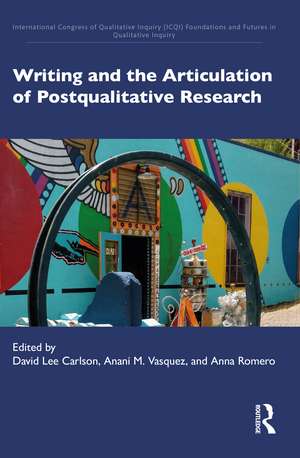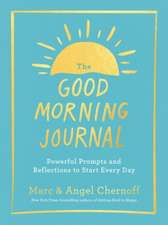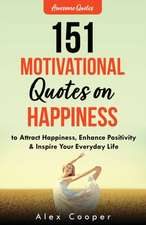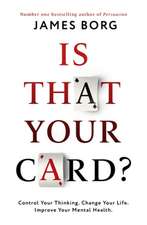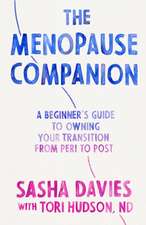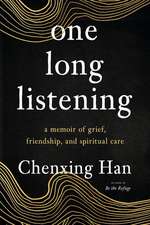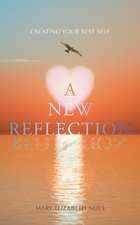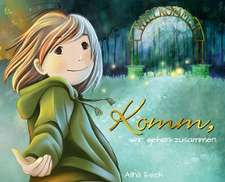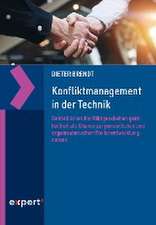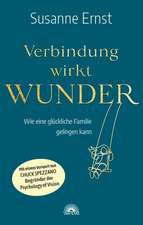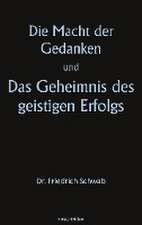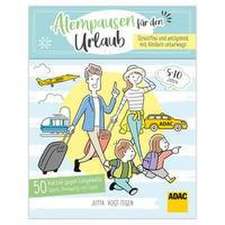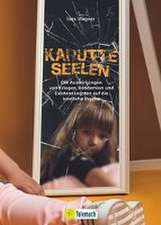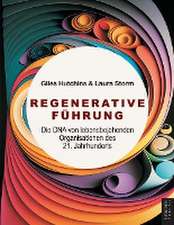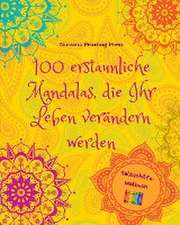Writing and the Articulation of Postqualitative Research: International Congress of Qualitative Inquiry (ICQI) Foundations and Futures in Qualitative Inquiry
Editat de David Lee Carlson, Ananí M. Vasquez, Anna Romeroen Limba Engleză Paperback – 25 apr 2023
This book has been designed for scholars in the social sciences and humanities who want to rethink how they use writing in their research endeavors and especially ones who are considering engaging with postqualitative research.
| Toate formatele și edițiile | Preț | Express |
|---|---|---|
| Paperback (1) | 384.02 lei 6-8 săpt. | |
| Taylor & Francis – 25 apr 2023 | 384.02 lei 6-8 săpt. | |
| Hardback (1) | 884.65 lei 6-8 săpt. | |
| Taylor & Francis – 25 apr 2023 | 884.65 lei 6-8 săpt. |
Preț: 384.02 lei
Nou
Puncte Express: 576
Preț estimativ în valută:
73.50€ • 76.53$ • 62.11£
73.50€ • 76.53$ • 62.11£
Carte tipărită la comandă
Livrare economică 10-24 martie
Preluare comenzi: 021 569.72.76
Specificații
ISBN-13: 9781032248929
ISBN-10: 1032248920
Pagini: 206
Ilustrații: 5 Line drawings, black and white; 29 Halftones, black and white; 34 Illustrations, black and white
Dimensiuni: 156 x 234 x 11 mm
Greutate: 0.32 kg
Ediția:1
Editura: Taylor & Francis
Colecția Routledge
Seria International Congress of Qualitative Inquiry (ICQI) Foundations and Futures in Qualitative Inquiry
Locul publicării:Oxford, United Kingdom
ISBN-10: 1032248920
Pagini: 206
Ilustrații: 5 Line drawings, black and white; 29 Halftones, black and white; 34 Illustrations, black and white
Dimensiuni: 156 x 234 x 11 mm
Greutate: 0.32 kg
Ediția:1
Editura: Taylor & Francis
Colecția Routledge
Seria International Congress of Qualitative Inquiry (ICQI) Foundations and Futures in Qualitative Inquiry
Locul publicării:Oxford, United Kingdom
Public țintă
AcademicCuprins
1. Re-Writing the Writer-Subject Qualitatively: A Philosophical Perspective 2. Measure for Measure for Measure: What Counts with Qualitative Research and Writing 3. Thinking-Writing (Pedagogically) Inspired by Post-Philosophies: A Qualitative(ly) Différance 4. In the Studio: Dance Pedagogies as Writing Pedagogies 5. "Genre Failing" 6. Writing Without Method 7. Writing as Uprootedness: Onto-Epistemological Considerations for Qualitative Research 8. Writing Qualitatively Through/With/As Disturbances 9. The Whirlwinds of Writing Qualitatively: From Warrior-Monk to Healing and Compassionate Detachment 10. Writing to Know: A Pathway to Self, Others, and the Social World 11. Writing with Feminist Materialists and Posthumanist Qualitative Inquiry 12. An Epistle Outlining My Queer-Feminist Orientation to Reading/Writing in Qualitative Research 13. Children's Creative Response to Bushfire Devastation and Deforestation Regeneration: An Analysis of an Emergent Curriculum and a Pedagogy of Hope 14. On Anti-Writing (Qualitatively)
Recenzii
"This is anything but an academic text on writing. This collection, edited by Carlson, Vasquez, and Romero and featuring work from exciting and thought-provoking scholars, brings writing into the conceptual foreground, extending writing beyond its communicative potential. In this collection writing is stretched, explored, and experimented with for its methodologic, creative, and theoretical potential as a mode of qualitative inquiry. The collection reimagines what is possible and permissible for scholarly writing." -- Linda Knight, Associate Professor, School of Education, RMIT University, Australia
"Do we live our theories? Writing and the Articulation of Postqualitative Research worries the wound of theoretical writing, picking at the scab that too often covers up the burning concerns qualitative methods aim to uncover. Have we become too comfortable with the descriptions of how our work changes the field, forgetting to actively forge new ways, embolden new modes? This is an exciting experiment in other ways of living, which is to say, other ways of living our thinking." -- Erin Manning, Research Chair - Speculative Pragmatism, Art, and Pedagogy, Director, SenseLab, Concordia University, Canada
"In this lovely collection, a new generation of 21st century social science researchers explore how writing continues to be a powerful method of inquiry that enables the new—what can and must be thought.□ For these authors, writing is never stable and dogmatic but always already available to re-invention and creation.□ Their writing stories and exemplars are inspiring." -- Elizabeth Adams St. Pierre, Professor, Mary Frances Early College of Education, University of Georgia, USA
"This is a thoughtful and inspirational collection of essays on the art of writing in qualitative research. The scholars write with a kind of vulnerability that invites readers into generative thought about their own writing practices. The authors’ words will send the reader to write with renewed vigor.□□ A welcome addition to the literature on writing in qualitative research."□ -- Susan Nordstrom, Associate Professor of Qualitative Research Methodology, The University of Memphis, USA
"This collection of textual compositions is already changing Writing and the Articulation of Postqualitative Research. Each chapter takes writing seriously, interrogates it honestly, and questions it (ir)reverently. The book offers a quantum shift for Novice and experienced researchers, artists, and scholars" -- Francyne M. Huckaby, Associate Provost of Faculty Affairs, Texas Christian University, USA
"Working to keep open pedagogical spaces of mutual support in critical and creative experimentation, Writing and the Articulation of Postqualitative Research places the politics of form center stage. This book highlights the ways that researchers are implicated in their research not only at the level of accountability to content and community but also at the level of the forms we use to share knowledge. It reminds us that (writerly) forms are never neutral and always embedded in value systems. For those of us working in university spaces, Writing and the Articulation of Postqualitative Research works like a lever that, in concert with other levers, renders academic life more capacious, nimble, attentive, curious, tender, and meaningful." -- Natalie Loveless, Associate Professor of Contemporary Art History and Theory, University of Alberta, Canada
"Do we live our theories? Writing and the Articulation of Postqualitative Research worries the wound of theoretical writing, picking at the scab that too often covers up the burning concerns qualitative methods aim to uncover. Have we become too comfortable with the descriptions of how our work changes the field, forgetting to actively forge new ways, embolden new modes? This is an exciting experiment in other ways of living, which is to say, other ways of living our thinking." -- Erin Manning, Research Chair - Speculative Pragmatism, Art, and Pedagogy, Director, SenseLab, Concordia University, Canada
"In this lovely collection, a new generation of 21st century social science researchers explore how writing continues to be a powerful method of inquiry that enables the new—what can and must be thought.□ For these authors, writing is never stable and dogmatic but always already available to re-invention and creation.□ Their writing stories and exemplars are inspiring." -- Elizabeth Adams St. Pierre, Professor, Mary Frances Early College of Education, University of Georgia, USA
"This is a thoughtful and inspirational collection of essays on the art of writing in qualitative research. The scholars write with a kind of vulnerability that invites readers into generative thought about their own writing practices. The authors’ words will send the reader to write with renewed vigor.□□ A welcome addition to the literature on writing in qualitative research."□ -- Susan Nordstrom, Associate Professor of Qualitative Research Methodology, The University of Memphis, USA
"This collection of textual compositions is already changing Writing and the Articulation of Postqualitative Research. Each chapter takes writing seriously, interrogates it honestly, and questions it (ir)reverently. The book offers a quantum shift for Novice and experienced researchers, artists, and scholars" -- Francyne M. Huckaby, Associate Provost of Faculty Affairs, Texas Christian University, USA
"Working to keep open pedagogical spaces of mutual support in critical and creative experimentation, Writing and the Articulation of Postqualitative Research places the politics of form center stage. This book highlights the ways that researchers are implicated in their research not only at the level of accountability to content and community but also at the level of the forms we use to share knowledge. It reminds us that (writerly) forms are never neutral and always embedded in value systems. For those of us working in university spaces, Writing and the Articulation of Postqualitative Research works like a lever that, in concert with other levers, renders academic life more capacious, nimble, attentive, curious, tender, and meaningful." -- Natalie Loveless, Associate Professor of Contemporary Art History and Theory, University of Alberta, Canada
Notă biografică
David Lee Carlson is Professor at the Mary Lou Fulton Teachers College at Arizona State University, USA.
Ananí M. Vasquez is a doctoral candidate at the Mary Lou Fulton Teachers College at Arizona State University, USA.
Anna Romero is a doctoral student at the University of Indiana-Bloomington, USA.
Ananí M. Vasquez is a doctoral candidate at the Mary Lou Fulton Teachers College at Arizona State University, USA.
Anna Romero is a doctoral student at the University of Indiana-Bloomington, USA.
Descriere
This book places writing as a primary consideration in the qualitative research process and asks its contributors and readers to consider the relationship between qualitative inquiry, the research process and the articulation of research.
